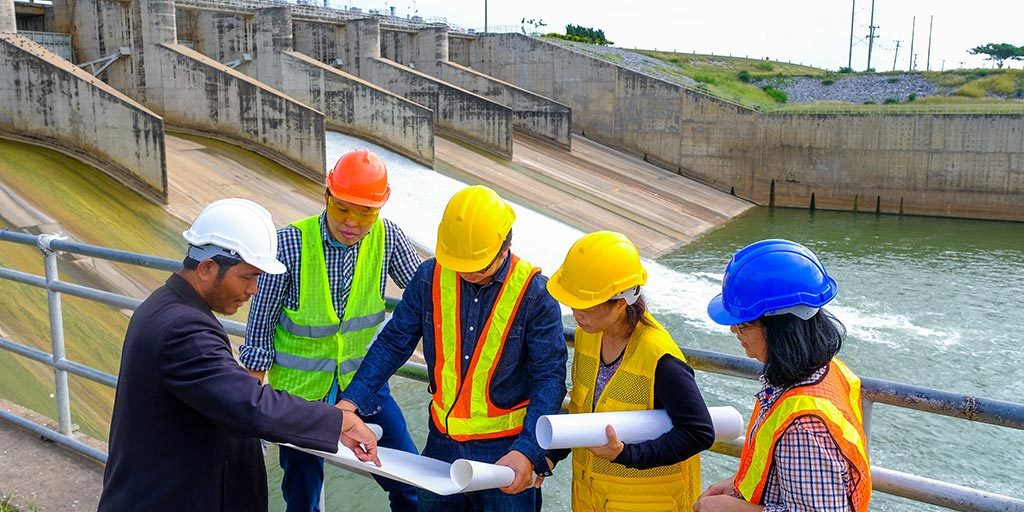Nearterm Blog
What it Takes to be a Good Flood Control Engineer

Flooding has been a problem for society for thousands of years. The ancient Egyptians often complained about the flood-prone Nile River and used dams and dikes equipped with intake and exit canals for irrigation. Early explorers in North America noted the Mississippi River’s penchant for flooding that would eventually cause damage to agriculture, create massive soil erosion and impede navigation to America’s busiest inland waterway.
That’s why engineers that specialize in flood control are vitally important to our environment, economy and infrastructure. Flood control engineers use dams, embankments, barriers and gates, pumping stations, sea walls and diversion channels to impede and divert the flow of water. Drainage networks are also important in preventing flooding, especially in towns and cities, by effectively collecting and removing stormwater and other surface run-off.
Along coastlines, effective beach management is important in managing flood risk, as a healthy beach can absorb wave energy, reduce wave overtopping and ultimately protect homes behind the beach. Flood control engineers are closely involved in the design, construction and maintenance of all of these structures.
Education
Flood engineers are considered a specialty within the civil engineering field. Engineering regulatory boards mandate a bachelor’s degree in civil engineering for entry-level flood engineers and a master’s degree to work in higher positions at places like the U.S. Army Corps of Engineers.
In addition to the proper education, flood control engineers may need to possess certifications and licensing in their respective states. Each state has its own board of civil engineering that issues licenses, with the American Society of Civil Engineers certifying flood control engineers in the U.S. As with many other professions, continuing education is an integral part of a successful career in engineering.
Skills and Experience
As beginning engineers gain knowledge and experience, they move on to more difficult projects and they have greater independence to develop designs, solve problems, and make decisions. Eventually, civil engineers specializing in flood control may advance to become technical specialists or to supervise a team of engineers and technicians.
Flood control engineers should possess the following specific qualities:
- Imagination
- Interpersonal skills
- Problem-solving skills
- Reading skills
- Writing skills
As mentioned earlier, one of the top employers for flood control engineers is the U.S. Army Corp of Engineers, which is a federal agency under the Department of Defense that primarily oversees dams, canals and flood protection in the U.S., as well as a wide range of public works throughout the world. The Corps of Engineers is made up of some 37,000 civilian and military personnel, making it one of the world’s largest public engineering, design, and construction management agencies.
Employment Outlook
Employment of civil engineers is projected to grow 6 percent from 2018 to 2028 according to the U.S. Bureau of Labor Statistics (BLS), about as fast as the average for all occupations. Much of the current U.S. flood control infrastructure is nearing its obsolescence and engineers will be needed to rebuild, repair, and upgrade levees, dams, locks and other systems that are nearing the end of their lifespan.
Civil engineers that specialize in flood control have one of our society’s most important, yet far too often overlooked responsibilities. While the path to entering the civil engineering field is demanding, it can be well worth it, as median annual salaries are nearing $87,000 per year according to the BLS.
Hiring Your Next Flood Control Engineer
The world relies on water and the control of our waterways is vital to the health and vibrancy of our modern society. Flood control engineers work in designing, planning and constructing modern infrastructure enabling continued progress.
Nearterm provides many different types of engineers you need to advance your company. We recruit professionals for temporary or direct hire and combine technology and customer service to give you the superior solutions you’re looking for, right now. Utilizing Nearterm’s expertise in finding top-tier engineering professionals nationwide, they’ll be able to find the right flood control engineer for you. Contact them today.
